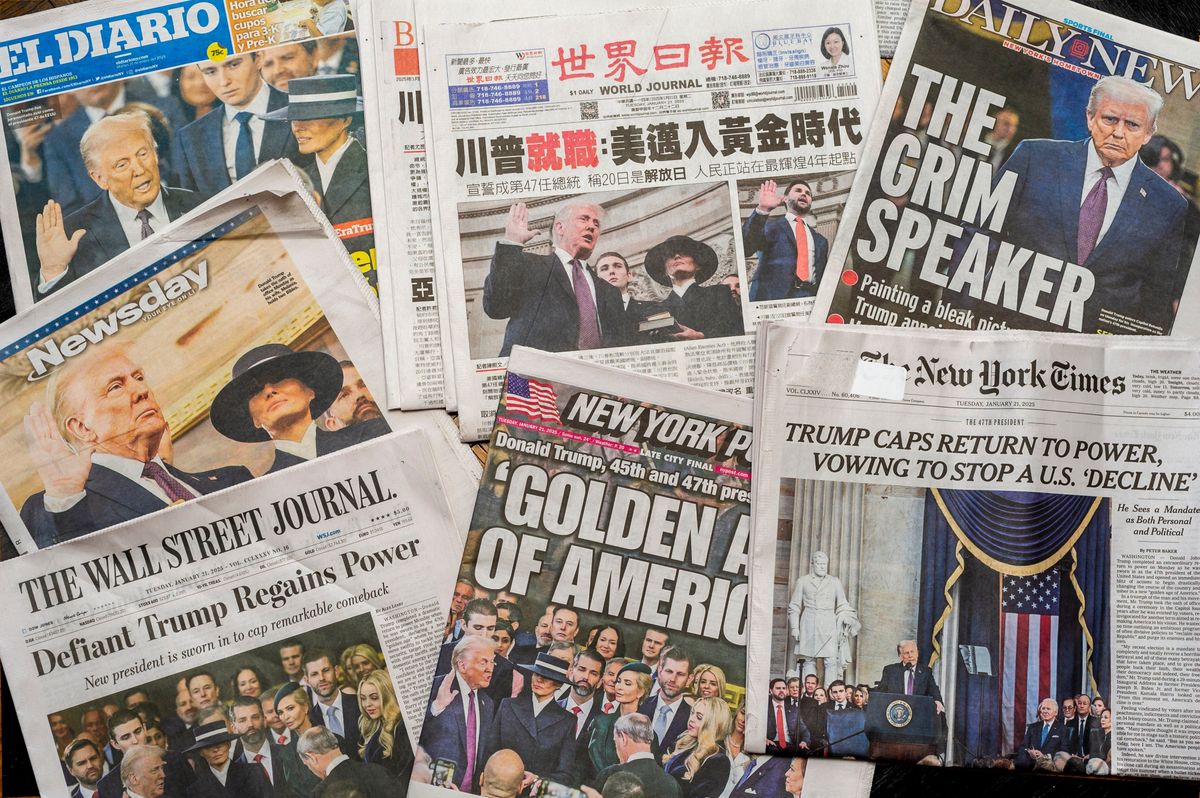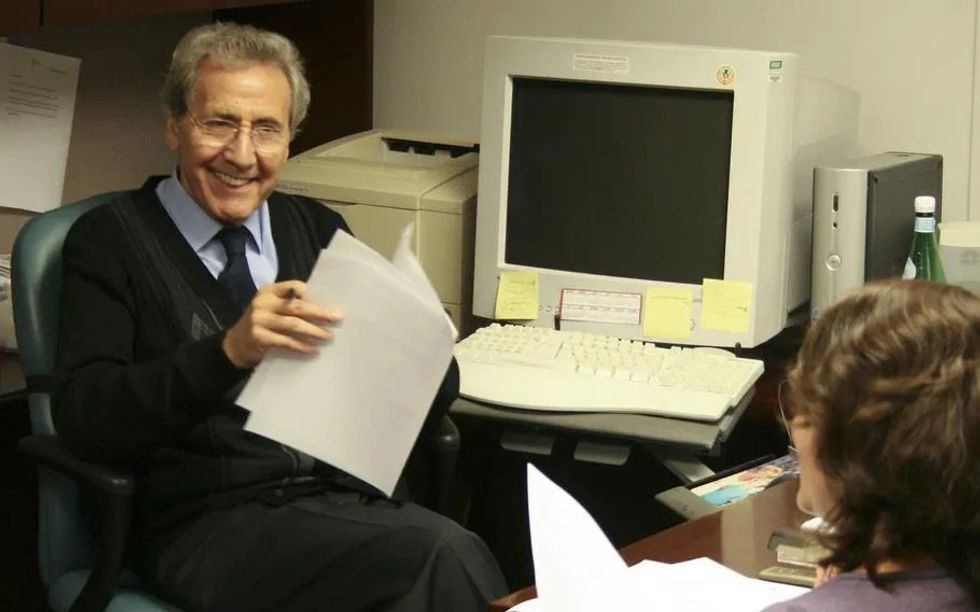
I have had the luckiest journalism career and life ever, but today I want to take a few minutes of your time talking about a man who was a vital part of both.
Tulio Peter David Mazzarella died last week.
“Dave” was 87.
And before I make this about me and my relationship with Dave, which started long before we both knew it, I want to tell you a little about the man, while linking to his mind-blowing obituary that will tell you most of the rest.
Dave was once described by then-Washington Post media critic Howard Kurtz as “maybe the best newspaper editor in America no one’s ever heard of.”
I would have struck the “maybe” as well as the last five words from that critique.
Dave shoehorned a mind-boggling newspaper career around two newspapers that were important to me, before I got to know him very well at a third.
Turns out, Dave, a Newark, N.J., native, was top editor at both of these newspapers during a career that took him around the world and to the top of more mastheads then I can count on both hands.
By 2000, we unexpectedly collided directly when Dave, fresh off his retirement at USA Today, took the job as ombudsman at Stars and Stripes, where I had spent the better part of last two years as managing editor of the important daily, which I also read as a sailor in the 1970s.
 Dave Mazzarella at work. Photo: Stars and Stripes
Dave Mazzarella at work. Photo: Stars and Stripes
It got worse yet on the very rare occasions civilian leaders at the paper cast aside their better judgment and threatened the newspaper’s integrity, by letting the military foxes loose in the henhouse.
I have always maintained that Stripes is at the very frontline of the fight for a free and independent press in America. Today, this has never been more true.
Dave vacated his ombudsman’s position during one of the paper’s heated times in 2003, and took over as the newspaper’s top editor in an effort to quiet things the hell down.
This also made him my direct supervisor, and that development got me to swallowing hard. All of a sudden, the man whose newspapers I delivered decades before — the best newspaper editor in America — had both his discerning eyes on me …
Don’t go telling me this isn’t a small, scary world.
Dave was the perfect guy for the job, but I had severe doubts if I was the perfect fit for him as his managing editor. In fact, I was sure I wasn’t, and figured it wouldn’t be long before he brought his own M.E. into the fold.
It was common practice at newspapers, particularly at Gannett, which owned both USA Today and one of the many newspapers I worked for during my still budding career, for editors to surround themselves with their people.
So I did my best to keep my head down, and mouth mostly shut, and began work underneath the toughest boss I ever had. He proceeded to teach me more about good newspapering than all my previous bosses bundled together.
Everything began and ended with the readers at a Mazzarella newspaper. By his thinking, there would be no newspaper without them.
“Why would the readers care about that,” he’d snap.
Every story the staff produced had to advocate for the readers, who have no direct voice in the newsroom. This will sound logical, but too often reporters and editors will let their bias and concerns get in the way of their editorial judgment, and the readers suffer for it.
Things were going along OK, and our reporters and editors were turning around some damn fine work for our readers, when Dave asked me one morning to produce a self-evaluation of my work as managing editor.
That’s when I figured my time was up. Honestly, I didn't know what I didn’t know until Dave came along.
So I sat down one night at home, poured a drink, and wrote a frank self-eval. I came down fairly hard on myself. I knew I was writing it for a man who grew up only miles from me in a hard-scrabble New Jersey suburb, and that there was no sense trying to bullsh–t a bullsh–tter.
I delivered the three-page critique and a few days later, the best newspaper editor in America called me into his office for a sit-down.
I figured I was on my way out, and somebody else was on their way in.
Instead, he told me I had written the most honest self-critique he had ever read, and while he didn't agree with all of it, it did save him the time of enlightening me on all my shortcomings.
Then he said, “Let’s fix those things and turn you into the newspaperman, I know you can be. You’re a helluva leader. A bit of a bomb-thrower, but a leader. Now let’s get back to work …”
That was it.
I never had a better day in the office than that.
And while that changed my life, I still had to be me, and I think Dave knew that. There was the time I dropped a bomb on our Pentagon appropriators during an interview with the late, great Bob Edwards of NPR’s Morning Edition fame ...
Edwards wanted to talk about the friction between a controlling military and a newspaper which wouldn’t be controlled. Things went great until I intentionally veered off script and let him, but mostly, them, know we could use a few more dollars to buy some much-needed help for our bustling Washington, D.C. newsroom.
Poor Dave caught the flak after that interview aired, but we got our new editors.
Just nine months later, Dave promoted me to the greatest job anybody could ever have in the business: Managing Editor of our worldwide editorial operations overseas.
I spent the next four years working closely with Dave from thousands of miles away while heading a staff in Europe, Japan, and the Mideast. I also began forging an important friendship with him that would last a lifetime.
When Dave made his way to Europe to check in on things, we always made a point to hit a favorite Italian restaurant. Tulio Peter David Mazzarella was one classy dude, who grew up in an Italian household, and had spent many years in Italy in various editorial capacities. He’d take command of the menu, and I’d just shut up and eat and drink while Dave charmed the staff and did the ordering in Italian.
By 2008, Dave had returned to his ombudsman role at the paper, to begin wrestling again with partial retirement, and I left the paper a year later after wrestling with people on the business side of the organization who valued their jobs more than our hard-fought editorial independence.
There weren’t enough bombs this time …
We stayed in touch fairly regularly after I left Stripes in 2009, until we stopped being in touch much at all the last few years.
I thought of him and his wise counsel all the time — especially when I’d write — and missed the thoughtful emails he’d type me that were worldly and wise.
He understood his reader.
The last time I saw Dave was in 2017. I was in Washington for some conference, and Dave was finally fully retired. We met at one of his favorite Italian restaurants in the city. Our meeting coincided with a certain, orange somebody’s first State of the Union address.
Dave and I had never discussed politics in earnest before that dinner, because it just would have gotten in the way of providing for the reader.
And because Dave is not here to tell it, I’ll relay my side of the conversation, confident he wouldn’t disagree with any of it. I was shocked, saddened, angry, and surprised that such a vulgar, incompetent person had just ascended to our nation’s top office. I figured it was a brutal aberration that would be corrected, and certainly never repeated — just to prove to you how wrong I can be about things sometimes.
When another one of our long dinners had ended, Dave insisted he drop me at my hotel even if it was in the other direction of his route home to his fabulous wife, Chris. As we navigated the rainy streets of D.C. that night, we hit an intersection of Pennsylvania Avenue, and just like that cops descended from everywhere, lights blaring, and shut down things to a standstill.
Turns out Trump’s motorcade was making its way up to Capitol Hill for his address.
That’s when I looked at Dave and said, “You know, if you wait for just the right time, and gun it, we could save millions of people a ton of grief. Hell, we might even be remembered as heroes.”
He said nothing for a few seconds, then turned to me and said, “Always the f–––ing bomb-thrower …”
Rest in peace, you legend.
(D. Earl Stephens is the author of “Toxic Tales: A Caustic Collection of Donald J. Trump’s Very Important Letters” and finished up a 30-year career in journalism as the Managing Editor of Stars and Stripes. You can find all his work here.)




